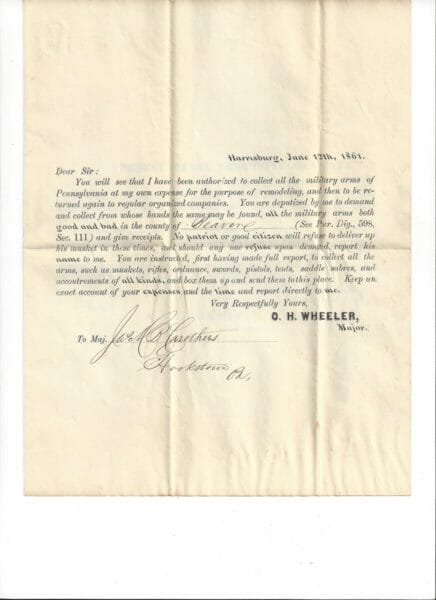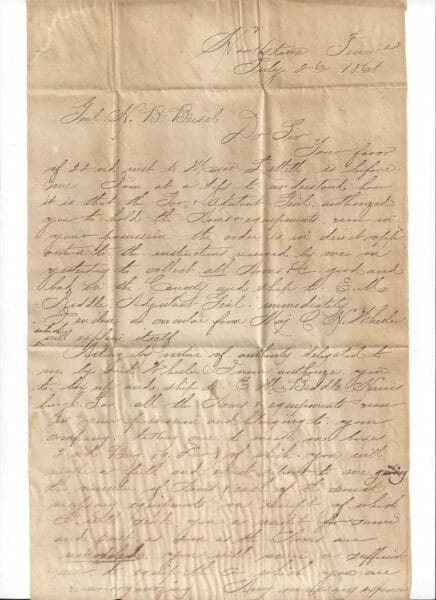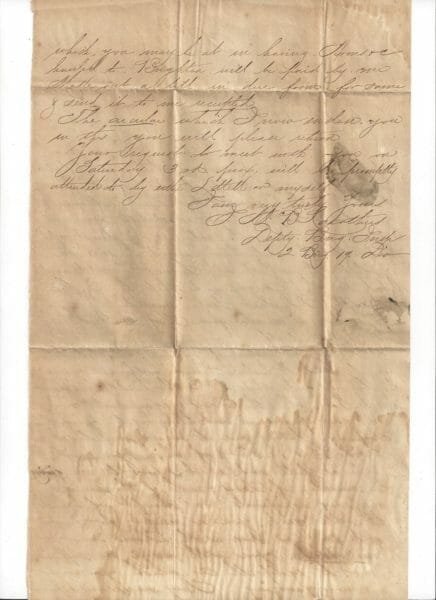
U.S.A. – -(Ammoland.com)- “You will see that I have been authorized to collect all military arms of Pennsylvania at my own expense for the purpose of remodeling, and then to be returned again to regular organized companies,” a June 12, 1861 letter from Maj. O.H. Wheeler to Maj. [unintelligible] Carothers ordered. You are deputized by me to demand and collect from whose hands the same may be found, all military arms both good and bad in the county of [Beaver]… and give receipts.”
A major had the authority to do that? What law or executive or martial law order was passed to allow for the military to compel civilians to surrender their arms? And noting the space where “Beaver” was filled in was a blank on a form letter, was the entire state subject to the order? What about other states in the Union? And people were OK with that?
These were questions I set out to find after being sent the original letter and a handwritten July 26 response (see below) by a reader who chooses to be identified as “a Tennessee supporter.” I am here to report my utter failure at getting answers to any of my questions.
It’s not like I didn’t try—it’s just that I’m not a historian, and if similar accounts appear on the internet, I don’t know how to find them. Case in point, I started with “O.H. Wheeler” and quickly found Google to be uncooperative, at least as it relates to this (I did find a Pennsylvania attorney by that name involved in a lawsuit in the 1870s and “irregular practices” disputes in the 1880s, but cannot state with certainty it is the same individual.) The closest I came was finding the Major “apparently held a position in the Adjutant General’s Office from 1861 – 1862 and a box containing “23 items and 1 folder” concerning “personal and job applicants” information is identified by the Pennsylvania Historical and Museum Commission, Bureau of Archives and History, Pennsylvania State Archives.
Having come up empty on the internet, I ventured out to my local historical society (before it closed down due to the pandemic). They had a roster for Ohio but not a lot else of relevance and suggested a trip to the National Archives might be in order. Unfortunately, as fabulously lucrative as what I do is, there’s not a lot left over for a travel and expense account after the demands for my lavish lifestyle of paying bills and taxes take their toll. Similarly, when I saw the Historical Society of Pennsylvania wants a “basic research fee” of $60 per hour, I decided I’d rather eat that week. Add to that, travel isn’t exactly encouraged in these days of Coronavirus precautions, and you can’t visit closed document repositories.
The next step was to reach out to those I know who have some history street cred, and I am fortunate to have established an internet relationship over the years with Clayton Cramer. He’s the author of the landmark “The Racist Roots of Gun Control” and a principal debunker of Michael Bellesiles’ exercise in wishful historical fiction, Arming America, with the end result that the author’s Bancroft Prize was revoked and he was compelled to resign from Emory University.
Without access to relevant records obtainable only after unknown research requirements, Mr. Cramer didn’t have direct knowledge of this situation. He did, however, offer a tangentially related perspective.
“Clement Vallandigham was a Copperhead lawyer who protested these disarming orders (on 2nd Amendment grounds), largely directed at Democrats,” Cramer recalled. “He was eventually expelled from the Union. After the war, he was defending someone in a murder trial, pulled the trigger on the ‘unloaded gun,’ and died.”
For what it’s worth, the client was acquitted.
As mentioned above, along with the Wheeler letter was a handwritten missive I’m assuming was the reply. I have to assume because I can only make out every other word, and that really makes me wonder how these people transmitted orders to the field with lives hanging in the balance if communications weren’t crystal clear.
“18th century handwriting is often beautiful,” Cramer responded. “The decline in the 19th century is very obvious. Reading wills from that century is really painful … A distant ancestor’s signature on his deed for what is now part of downtown New Haven was impossible for me to read.”
You can see what he’s talking about by looking at the Constitution. True, it still looks strange to the modern eye, but I can still read it. That reply letter, forget it, and I spent time with my son trying to decipher it and writing down words we could make out before giving up. And with that, here are the documents in question — feel free to download and enlarge them and see if you have better luck than I did:



Perhaps some of you are knowledgeable about this and can educate us in “comments,” or know someone you think can who you can send this to. Perhaps some of you will have no problem reading the handwriting that frustrated my poor deciphering skills. Perhaps there are Civil War buffs or historians who know all about such disarmament orders who will slap their foreheads and easily point us to resources that tell us more.
My primary interest in this is to determine where Wheeler got off ordering arms to be surrendered, and what would have happened had a gun owner told him to go pound sand. The antis are constantly trying to convince us that “gun control” in this country is a time-honored practice as their way of establishing, if not legal precedent, the perception that we’ve always been fine with it. To back that up they cite ordinances precluding the storage of powder in homes, edicts condemning concealed carry, and Wyatt Earp and his disarmament diktats in Tombstone…
My counter-argument is just because people went along with it and did not mount legal challenges does not mean those “laws” would have been upheld if they had been contested in court. Then again, seeing as how these letters are from the Civil War, we can’t forget that the Lincoln administration also got away with suspending habeas corpus, suppressing newspapers, and even, according to a disputed account, considered arresting the Chief Justice of the Supreme Court. With that as background, it hardly seems a stretch that the order to collect private arms and turn them over to the troops would not have been considered “lawful” under the circumstances.
And that raises the real question that should concern us: Could that “precedent” still be applied today in a “national emergency”?
UPDATE: See a transcription of the handwritten letter.
About David Codrea:
David Codrea is the winner of multiple journalist awards for investigating/defending the RKBA and a long-time gun owner rights advocate who defiantly challenges the folly of citizen disarmament. He blogs at “The War on Guns: Notes from the Resistance,” is a regularly featured contributor to Firearms News, and posts on Twitter: @dcodrea and Facebook.
